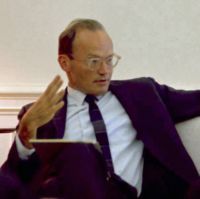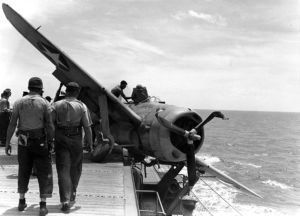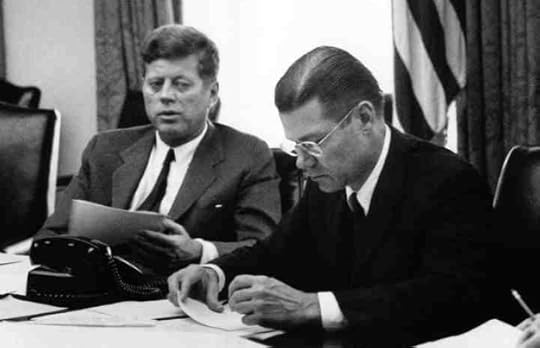Thomas E. Ricks's Blog, page 239
July 20, 2011
Bundy's explanation of why JFK and LBJ handled their generals so poorly: Both lacked confidence in handling military

This observation is worth keeping in mind as you consider how we got so deep into Vietnam:
Neither of them had the kind of feeling that it was politically okay for him to simply tell the generals what they ought to do, that for different reasons, both General Eisenhower, because he had more stars than they did, and Mr. Truman, because he just didn't give a damn, really did have. I've exaggerated in both cases, but still on balance, Truman and Eisenhower, and indeed FDR, had more self-confidence in dealing with their senior military advisors than either Kennedy or Johnson did." (From pp. II, 4-5, McGeorge Bundy Oral History, Interview II, 17 February 1969, LBJ Library.)
Hey, speaking of bygone aides of rotten White Houses: How did Bill Moyers manage to go from being LBJ's spokesman to being the moral arbiter of American journalism? Pretty good maneuvering there, considering he was the mouthpiece for the man who was the most damaging president we had in recent decades, at least until George W. Bush. The jury is still out whether the younger Texan's choice of a poorly run war and fiscal mayhem ultimately will outweigh the older Texan's choice of same. I wonder if Karl Rove will have a PBS series in 20 years. ...
Idea for file: What say we put a constitutional moratorium on Lone Star presidents, kind of like a penalty box in hockey? (And no, I don't consider Eisenhower a Texan, even though he was born there. Plus, he kept us out of a war in Vietnam.) I'm usually against constitutional amendments, but I might sign up for this one.
The strategic relationship between the U.S. and India: Coming along nicely

By Richard Fontaine
Best Defense directorate of long-term grand strategy
Secretary of State Clinton's swing through India points again to the tremendous potential of an Indo-American strategic partnership over the long term. But it also demonstrates how tough some of the challenges will remain over the next couple of years.
Secretary Clinton is in India at the helm of a large, high-level government delegation for the second annual Strategic Dialogue. The first round, held in Washington last year, started to pull the bilateral relationship out of its previous doldrums and set the stage for President Obama's successful visit to India last fall. This round is aimed at sustaining last year's progress and implementing the many commitments both sides took on.
That's tough to do. Many of the big policy changes on the American side have already been made -- the United States has supported Indian access to civilian nuclear technology, a change that required amending domestic law and international agreements; it modified its export controls so that India has greater access to American technology; it now supports India's membership in the four international nonproliferation regimes; and the president endorsed Indian permanent membership on the UN Security Council. There is always more to do, to be sure, but these are serious moves.
On the Indian side, most of the expected policy changes are stuck, largely due to domestic politics. The civil nuclear deal is not operational because of a flawed liability law. Key defense agreements remain incomplete. India has granted little in the way of market access, despite repeated American hectoring. And the United States bemoaned the fact that the two American companies bidding on a major fighter jet program were knocked out of the competition. [[BREAK]]
On other issues, too, the two sides differ. America wants to draw down in Afghanistan, talk to the Taliban, and ensure that Pakistan is part of the solution there. India wants America to stay, rejects the idea of a Taliban parley, and believes that Pakistan is part of the problem there. Trade, climate change, and other areas mark gaps between the two sides.
In the Middle East, where there is vast scope for the world's two largest democracies to cooperate in support of the Arab spring, the vestiges of India's nonaligned, non-interference tradition endure. At his press conference earlier this week with Secretary Clinton, Minister of External Affairs S.M. Krishna expressed "hope for the fulfillment of the aspirations of the people of the region for an early restoration of peace and stability." This is a bit strange; it's a fair bet that the demonstrators across the Middle East have been fighting for human rights and economic opportunity, not a restoration of old-guard stability.
Yet despite all of this, there are good reasons -- very good reasons -- for optimism. First, the strategic logic is compelling. The ascent of China and the hedging this now produces across Asia helps focus the United States and India on their shared interest in an Asian balance of power. The values aspect, too, is real; a younger generation of Indian officials sees the world through less traditional eyes, and the government quite deliberately now refers to itself as the "world's largest democracy." There is bipartisan support on both sides for a close strategic relationship, and private sector support for better economic ties.
Over time, I'd bet these factors trump all of the differences, challenges, frustrations, and misunderstandings that will doubtlessly fill the days of Indian and American officials alike. America's India policy is a rare example of true, sustained strategic thought across multiple administrations. The United States has made its major policy changes, and spoken in warm terms about the potential for close ties, not in expectation of immediate tangible payoffs but because it is building a long-term relationship. That's rare.
That relationship will be aided by patience on Washington's part and tangible deliverables on India's part. Neither finds such moves natural. But the U.S.-India relationship is one that will take careful nurturing over a long period of time as it moves toward an uncertain future. Not satisfying in the short run, maybe, but worth it in the long.
Richard Fontaine has been a staff member for the NSC and a foreign policy advisor to Senator John McCain and now represents at CNAS.
No. 14: What happens in Bahrain ... just don't seem to stay in Bahrain anymore

We now have our second Navy command relief in recent days related to Bahrain.
This one, the commander of an EA-18 squadron, didn't hit a buoy, brave boys. He hit a bottle, allegedly.
July 19, 2011
The defense budget implosion (V): The poll numbers for sharp cuts are rolling in

About half of Americans polled say
that the budget can come way down. Nearly 80 percent say we spend too much
defending other countries.
Whether you agree or not with
those views, it is hard to disagree that the Pentagon elevator is going
down fast. I am amazed at how little I am seeing written about this. I
suspect the next 10 years will see a major revamping of the military
establishment, in ways we hardly suspect now. Marines out of aviation? Massive
consolidation of support services? Mandatory halving of headquarters, with a
freeze on hiring any additional contractors, and termination of contractors
upon expiration of existing contracts?
Anyone seen good work on this,
looking down the road to a substantially smaller
Pentagon budget?
(HT to MD)
Putting it to a vote: Who do you think was the worst president of the 20th century?

Who was the
worst American president of the 20th century? TNC joins
the discussion.
The candidates,
according to you, are:
Woodrow
Wilson
Warren
Harding
Calvin Coolidge
Herbert
Hoover
Franklin Delano
Roosevelt
John F. Kennedy
Lyndon Johnson
Richard Nixon
Ronald Reagan
I'm only including FDR because
someone nominated him. I'd actually say he was the best president of the
century, and one of our top five overall. George W. Bush, alas, is not
eligible, though as we have discussed he might have retired the crown for the
21st century.
You can post a comment, or e-mail
me at the address above the little postage stamp foto of me on the right hand
side of this page.
Smoke 'em if you got 'em?: Is marijuana therapeutic for soldiers' PTSD?

If
so, the military's anti-drug program is gonna face a major new challenge. "It
works for a lot of the guys coming home," reports an Army veteran of Iraq.
Watching the slow tragic unfolding of the Greek drama in the house of Murdoch

As the chickens come home to roost
in London, Joe Nocera captures
well the symmetric nature of the Murdoch scandal.
It couldn't happen
to a nicer
bunch of guys. There
has always been a rough edge in good journalism, but these people have acted
like thugs -- a point seemingly lost on the editorial page of the Wall Street Journal as it comments
on its owners. I agree with pretty much everything Nocera writes. As with other
major scandals, I am struck not only by how we never know what is going to
happen next, as Nocera says, but also, how in retrospect each step seems
inevitable.
July 18, 2011
Link analysis, terrorism, and 'Hamlet'

Since 9/11, lots of
hard work has been done on "link analysis" -- looking at who communicates with
whom, who sends money to whom, and so on, as a way of detecting and delineating
terrorist networks, nodes and points of vulnerability. David Ignatius makes
this fact a key to his new novel, Bloodmoney.
Now a Stanford
professor of English is doing link analysis in literature. To my surprise, he
is coming up with some
interesting stuff on Hamlet:
" ... of all the characters who speak to both Hamlet and
Claudius, only two manage to survive the play (Moretti calls this part of the
network the "region of death"). Or one notices that Rosencrantz and
Guildenstern, the most famous pair of minor characters in all of Shakespeare,
never speak to each other."
JFK (II): He was learning, so he wouldn't have sent combat forces to Vietnam

Fred Kaplan is one of the more interesting defense
writers around,
taking a
broad approach. Here, by the way, is his review of Robert Dallek's new book
on Kennedy.
And here are two of his e-mails to me in response to my
Friday post about how I had come to think Kennedy
was a terrible president. I disagree with what he says here, but I think it
is worth considering.
By Fred Kaplan
Best Defense department of defending JFK
[E-mail 1:]
Just to state a few points on the question of whether JFK
was a terrible president:
(1) Yes, he listened to Taylor and other hawks early on, but
the Cuban missile crisis, which you glide over, was a turning point. The real
significance (which I've gleaned from a close examination of the tapes) is
that, quite early on (the 4th day), JFK was looking for how to give Khrushchev
a face-saving way out; that when Khrushchev offered the secret trade (his Cuban
missiles for our Turkish ones), JFK wanted to take it right away, while
everyone -- and I mean everyone around
the table (except, significantly, George Ball) -- was adamantly opposed. I think
that the crisis taught him that all those smart experts sitting around the
table weren't any smarter than he was. (He was beginning to see this point
during the Laos crisis, when his generals behaved like bureaucrats -- the Army
wanted to invade, the Air Force wanted to send B52s, the Navy wanted to send
carrier groups.) Another key thing: JFK told six people that he was taking the
deal and swore them to secrecy. Among the people he did not tell was LBJ. This
was a critical mistake, as it left intact a false lesson of the crisis, which
JFK's successors (including LBJ) applied to Vietnam. (McGeorge Bundy concedes
this point in his memoir.) [[BREAK]]
(2) One big difference between JFK and LBJ on Vietnam is
that JFK never sent "combat troops," in fact always drew a line on
that point. Now true, the line between "combat troops" and
"advisers" are getting a bit hazy, but there's some evidence he
wouldn't have plunged across the line so avidly. Point (1) is circumstantial
evidence. There's also the fact (I think this is in Richard Reeves) book that
Kennedy went to Vietnam in the early '50s, I'm pretty sure he went to Dien Bien
Phu, or thereabouts, where he talked with some French commanders, who told him
the United States should never get involved in this place.
(3) Someone once asked Clark Clifford if he thought JFK
would have escalated in Vietnam. Clifford (who I'm not saying should be trusted
on all matters, by the way) thought a moment and said, "No. He was too
cold." In other words, he didn't get emotionally involved in something.
Johnson's tragedy was that, however skeptical he was of Vietnam (cf his taped
exchange in the Oval Office with his old pal Richard Russell), he was caught up
in the idea of not wanting to be the first president to lose a war, etc. I
think JFK would have addressed the matter more coolly, especially after the '64
election.
(4) Watch the ABC
documentary Crisis, about how JFK handled the crisis down in
Alabama in 1963, when Gov George Wallace was trying to block two Negro students
from enrolling in the state university. (It's on DVD.) His resolution, in
retrospect, was very similar to the resolution of the Cuban missile crisis.
There are other points here. My bottom line is that Kennedy
changed a lot after the Bay of Pigs and Laos, and changed even more after the
Cuban missile crisis....
[And e-mail 2, in
response to my blaming JFK for getting us into the Cuban missile crisis in the
first place]
I'm not sure if
Kennedy is to blame on getting into the crisis in the first place. Yes, at
Vienna he may have let Khrushchev think he could get away with this
"harebrained scheme," but an important thing that happened after
Vienna was Kennedy's calling Khrushchev's bluff on Berlin. People don't
remember the Berlin crisis of August-September 1961. Khrushchev said he was
ripping up the treaty that divided Berlin into four zones, that West Berlin
would now be part of East German, and if we tried to prevent this, there would
be war. Kennedy confronted him (in fact, I have documentary evidence that he seriously considered
a nuclear first-strike to stop him -- though in the end, he decided the risks
and damage would be too great -- others were in favor of it, though, eg, Paul
Nitze). US and Soviet tanks faced each other along a checkpoint, within firing
range, for 25 hours, before Khrushchev backed away. It was at this point that
Khrushchev decided to send missiles to Cuba. He realized that, with the first
spy satellites, the US knew that his claims of "churning out ICBMs
like sausages" was bullshit, that the missile gap wasn't real, or rather
that it was but that it was the US that was far ahead of the USSR. (One reason
he knew this was that the deputy secretary of defense said so in a speech.) He
feared the possibility of a US strike and knew that the USSR would not be able
to retaliate in force. (This was one conclusion of Kennedy's 1st-strike study,
though, as I said, Kennedy -- and almost everyone else around him -- judged that
the damage, especially to West Europe through fallout, would be too extensive
to take the risk; the Berlin crisis was ultimately settled through back-channel
diplomacy.) So he saw the MRBMs in Cuba as a way to close the gap, at least for
a while (some MRBMs 90 miles from the US would have the same deterrent effect
as some ICBMs half a world away). And then (to continue my rebuttal of your
claim that JFK was the worst president in history), Kennedy managed that crisis
to a peaceful resolution, despite enormous pressure -- from his
civilian advisers and the chiefs -- to bomb the missiles. Read the transcript of
the last day of the ExComm session (not the one in Zelikow's book, which, he
now realizes, was based on a poor transfer of the tape) but either the one put
out by the JFK Library or the one that Zelikow published in a 3-volume set for
the Miller Center at UVA.
A reminder: Battalion commanders should not sleep with the wives of the enlisted

I know, easy
to forget that rule. There are so many regulations.
P.S.: If the rule does slip your
mind, don't text her thusly: "I melt every time I c ur body ... Would I b
greedy if I asked 4 more pics?"
Thomas E. Ricks's Blog
- Thomas E. Ricks's profile
- 436 followers



